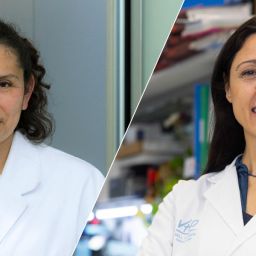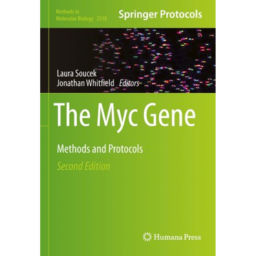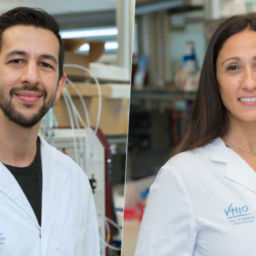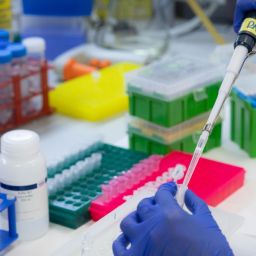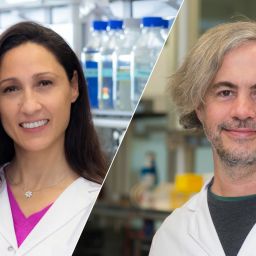
- Results of VHIO-led pharmacokinetic analysis of Omomyc, a therapeutic mini-protein that targets the MYC oncogene which is found deregulated in most human cancers, have now published as an open access Communication article in Cancers (1)
- Lasting structural integrity of therapeutic proteins in the target tissue is crucial to maintaining their proper function. Since the in vivo stability of these agents can be affected by proteolytic degradation, the validity of Omomyc as the first direct inhibitor of MYC has frequently been questioned.
- Investigators of VHIO and ICREA-born spin-off Peptomyc S.L. and VHIO’s Models of Cancer Therapies Group led by Laura Soucek have now reported that Omomyc shows longer lasting structural integrity in tumor tissue compared to blood.
- The first Omomyc-derived compound, OMO-103, successfully completed phase 1 clinical trial last year. Previous results, presented at the 34th EORTC-NCI-AACR Symposium, Barcelona, 26-28 October 2022, showed that this first-in- class MYC inhibitor had few side effects, was tolerable, and stabilized disease in some patients.
Omomyc is a first in class MYC inhibitor that targets the MYC oncogene which is deregulated in most tumor types. This therapeutic mini-protein was developed in-house by the Vall d’Hebron Institute of Oncology (VHIO) and the Catalan Institute of Research and Advanced Studies (ICREA) spin-off company Peptomyc S.L. which was co-founded by VHIO’s Laura Soucek in 2014, and continues to show clinical promise as the first direct inhibitor of MYC.
“Our first Omomyc-derived compound, OMO-103, successfully completed a phase 1 clinical trial in October 2022. Notably this is the first MYC inhibitor to have ever reached this stage of clinical development. However, given that the in vivo stability of these therapeutic proteins can be affected by proteolytic degradation, the half-life duration of Omomyc had been questioned in the past,” explains Laura Soucek, co-Director of Preclinical and Translational Research at VHIO, Chief Executive Officer of Peptomyc, and an ICREA Research Professor.
The maintenance of the structural integrity of therapeutic proteins in the target tissue enables them to deliver their lasting anti-cancer blows. In this present study (1) Peptomyc investigators and researchers of VHIO’s Models of Cancer Therapies Group led by Laura Soucek performed pharmacokinetic analysis to assess the in vivo stability of Omomyc in blood serum and tumor tissue in a xenograft mouse model of colorectal cancer. Recently published open access in Cancers they report that this mini-protein showed lasting structural integrity in tumor tissue for at least 72 hours.
“Omomyc promises a new therapeutic avenue to target MYC, a most-wanted cancer-causing protein. Here, our findings provide evidence that Omomyc persists in the tumour tissue longer than in blood,” says Soucek, co-corresponding author of this present study.
The initial preclinical studies on the purified Omomyc mini-protein evidenced its long terminal half-life in plasma (estimated to be >60 h in mice). Up until now, the proportion of tumor distribution and, most importantly, the structural integrity of the drug in tumor tissue have remained unknown.
“To date, only indirect approaches using either radioactively or fluorescently labelled Omomyc, have been used to address this question. The use of such covalent markers may however alter the intrinsic stability of the therapeutic protein of interest or could reflect the kinetic behavior of only a portion of the functionally active molecule,” adds Marie-Eve Beaulieu, co-founder and Chief Scientific Officer of Peptomyc, and co-corresponding author.
To more accurately calculate the absolute levels of this mini-protein’s structural integrity, the investigators used a label-free, high-resolution mass spectrometry approach for the first time and assessed the distribution of intact Omomyc to the tumor following intravenous administration in mice.
Results confirm that Omomyc not only reaches the tumor after 2 hours following intravenous administration at tissue concentrations within the range of serum’s, but also that the tumor concentrations are higher than serum’s and persist there for at least 72 hours.
“Our findings are especially relevant now that Omomyc is being evaluated in clinical trials (2) since pharmacokinetic data are usually collected by analysis of blood samples in clinical practice,” adds Soucek.
Reported results indicate for the first time that the Omomyc behaves as a stable protein in tumor tissue and that the pharmacokinetics studies performed in blood (serum and plasma) samples, in preclinical models or in standard clinical practice, provide a likely underestimation of its distribution and persistence in the tumor compartment.
“Additionally, our described methodology, while not straightforward to implement in the normal routine of a clinical trial, could potentially be used for more accurately quantifying other therapeutic mini-proteins that might also display different stability in tumor tissue compared to blood samples,” concludes Laura Soucek, Principal Investigator of VHIO’s Models of Cancer Therapies Group.
This research was supported by funding received from the European Union’s Horizon 2020 research and innovation programme and the Spanish Ministry of Science and Innovation.
###
References:
- Beaulieu M-E, Martínez-Martín S, Kaur J, Castillo Cano V, Massó-Vallés D, Foradada Felip L, López-Estévez S, Serrano del Pozo E, Thabussot H, Soucek L. Pharmacokinetic Analysis of Omomyc Shows Lasting Structural Integrity and Long Terminal Half-Life in Tumor Tissue. Cancers. 2023; 15(3):826. https://doi.org/10.3390/cancers15030826.
- Phase 1/2 Study to Evaluate Safety, PK and Efficacy of the MYC-Inhibitor OMO-103 in Solid Tumours (MYCure).





